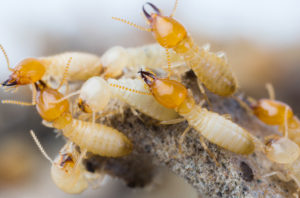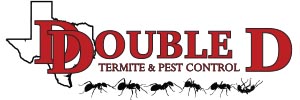

Termites have commanded more attention than any insect pest. Double D Termite control specialists are knowledgeable in building construction, termite biology and behavior, the proper and safe use of pesticides, the use and maintenance of equipment, and safety. We always use considerable judgment in the performance of every job!
How do I know if I have termites?
Winged ant or termite?
Ants
• Elbowed antennae.
• Three distinct body segments with a slim “waist”.
• Front wings longer than back ones
• Various sizes.
Termites
• Straight antennae.
• No “waistline”.
• Wings long and of equal length.
• Usually only about 1/8″ in length
What can termites do to my home?
How to save your home, and your budget, from being eaten full of holes.
What can termites do to my home? Termites eat wood. In their natural state, they eat fallen logs and stumps off the forest floor. But on your property, they can eat away the equity you have built up in your home and property. Termites infest millions of homes nationwide, causing over $750 million in damage annually, according to the United States Department of Agriculture.
What should I know about a termite colony?
Subterranean termites are native to every state except Alaska. A colony may include up to several million individuals, living as deep as 20 feet underground. Feeding on cellulose-based material, such as wood, termites find human dwellings offer the ideal combination of warmth, moisture and food.
| The Queen occupies a “royal cell” with the King. She may live up to 25 years, laying many thousands of eggs annually. | ||
| Supplementary Reproductives act as replacements for the Queen if she should die. They may also produce eggs even if the Queen is healthy to help increase colony size. | ||
| Soldiers with armored heads and strong jaws, protect the colony from enemies, most commonly ants. | ||
| Winged Reproductives are the termites you may see when they “swarm”, usually in the spring signaling a well-developed colony. After shedding their wings, reproductives pair off, burrow into the soil and begin a new colony. | ||
| Workers represent most of the termites in a colony. Blind and sterile, they forage for the colony’s food. Most damage is caused by worker termites. |
How can a professional pest control firm help?
Only a trained professional understands the intricacies of how a termite colony behaves. Using advanced materials, a skilled professional applicator can effectively protect your housing investment.
Because termites need moisture and have a low tolerance to air and light, they live underground, attacking a home from below. A loose mortar joint, a minute space around a drain pipe, or a settlement crack in the basement is all they need to gain entry.
Aren’t new homes and houses with concrete slabs virtually termite-proof?
The experience of homeowners nationwide shows that no home, new or old, is safe from termites. By building mud tubes, termites can cross concrete, brick, cider block, metal termite shields, pretreated wood, or any barrier other than a professionally – applied termite treatment.
If I haven’t seen swarming termites, or traces of damage, can my home still be in danger?
Unfortunately, yes. When a colony swarms, the winged termites may be in the air for just a few minutes and you may not see them. Termites also eat wood from the inside out, making their activity detectable only by professional termite inspection.
When is the right time to call in a termite professional?
Call Double D for an inspection at the first indication of termites, for cost effective treatment. The longer you delay treatment, the more damage termites will do. Repairs will become more extensive, and more expensive. Generally speaking, the sooner you approve treatment, the better.
If you are considering listing your home for sale, be sure to have Double D inspect at no cost prior to bringing the property to market to avoid problems later.
How does a professional inspection uncover termite activity that’s invisible to me?
While much termite damage is hidden, termites have few secrets to the eyes of a professional. He knows the conditions termites favor, and how to uncover termite activity which the untrained eye might pass over – with damaging results.
What will you do to get rid of the termites?
Create an invisible barrier between your home and the termites, blocking them from your house. Treatment begins with a thorough inspection. Then, an analysis of your home and property is prepared. Finally, applying materials to effectively repel termites.
How will you achieve this invisible barrier?
Methods vary with each house, depending on the type of foundation or basement, construction chimneys, etc. By digging narrow trenches along walls and drilling through horizontal surfaces and into voids, materials can be applied where they will kill termites within your home and block the colony’s reentry.
Won’t this kind of thorough treatment be a lot of trouble?
No. Our modern termite control treatment will usually take a single day, or less, with very little upset to your daily routine. And, considering the fact that a home is the largest single investment most American families will ever make, protecting its value is not much trouble at all.
What you’ll see us do as we treat your home.
| Trench and treat the outside foundation. The first basic step. | ||
| Trench and treat inside the crawl space foundation wall. This is necessary if your house has a crawl space or a basement with a dirt floor. | ||
| Treat the soil under a crawl space. If space is limited, we’ll usually have to drill small holes in the outside concrete wall surrounding the crawl space. | ||
| Treat beneath the flower boxes or other parts of the structure that protrude out from the main structure. | ||
| The soil in bath traps must be treated and access panels may have to be cut. | ||
| Treat behind the brick veneer. | ||
| Treat the spaces around the chimney. | ||
| Treat hollow blocks. | ||
| Treat cracks, expansion joints and voids under the basement floor or slab. | ||
| Treat near the ducts in the slab. | ||
| Treat the areas where the pipes and utility lines penetrate the slab or basement floor. | ||
| Treat through holes drilled around the perimeter of the slab. | ||
| Treat the soil beneath the porch and/or deck. | ||
| Treat between the steps and house. | ||
| Drill and inject the brick piers. |
Make your home a fortress against termites.
Our termite treatment creates an invisible underground barrier that prevents termite entry.
Inside your house: a barrier to resist termite infestations.
Beneath your home: a barrier to resist future termite infestations.
And for you: the peace of mind that comes only in knowing your home investment has been treated professionally.
Your home is your castle. Make it a fortress against termites, as well
Have a pest problem that we haven’t covered here? Just give a call at 1-817-558-PEST (7378) and talk to a Double D representative, or
-
- You can send us a e-mail.
